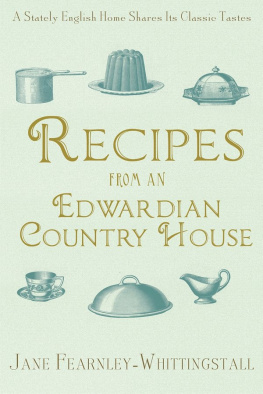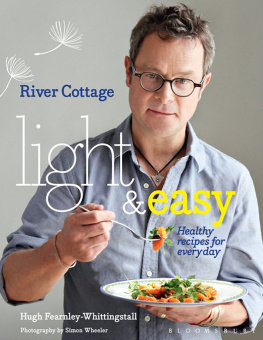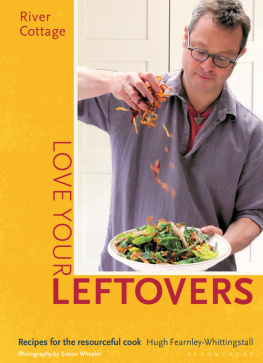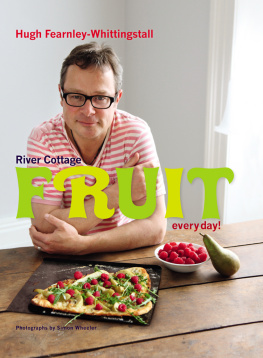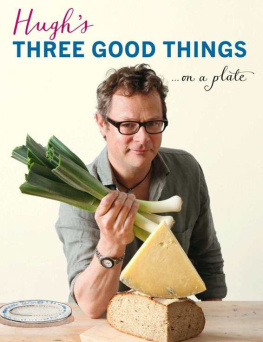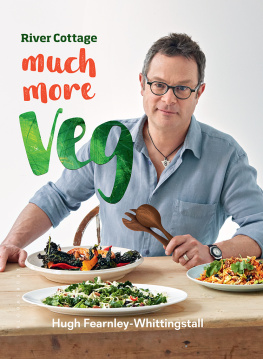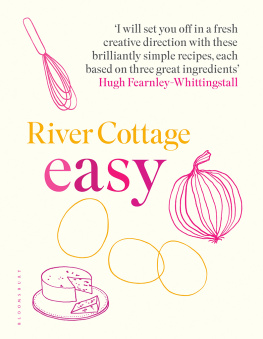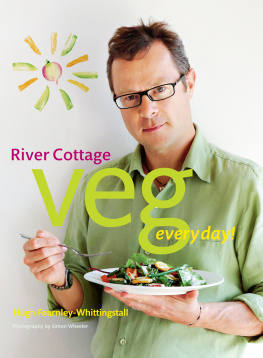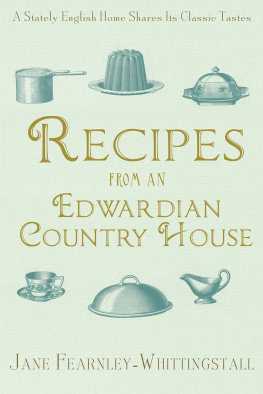Contents .
W ith happy memories of my mother and grandmothers and their delicious food
Introduction .
M y maternal grandparents linked me to the Edwardian Age. My grandfathers career in the British Diplomatic Service took him to Peking, Constantinople (now Istanbul) and Helsingfors in Finland. In 1921, wishing to bring up his young family in England, he took early retirement and bought a country estate in Wiltshire, centred on a rambling manor house dating back to the 15th century.
It was to Hazelbury Manor that my mother and her sisters brought their babies at the outbreak of World War 2 in 1939, so the family could all be together while their husbands were away in the army and the Royal Navy. Thats how I came to spend the first six years of my life, and thereafter every summer holiday until I was fourteen, immersed in a way of life that pre-dated even the First World War. My grandparents house and lifestyle was not as grand as that of the TV families in Downton Abbey and Upstairs Downstairs. Footmen and grooms had left to fight for their country, maids had signed up for war work. Still, at Hazelbury pre-war standards were somehow maintained with a skeleton staff of butler, housekeeper, cleaner, cook and kitchen-maid, plus assorted nannies and nursery maids. Outdoors there were two gardeners and a retired groom who, in the absence of horses, stoked the coke boilers and split logs for the open fires. Although my grandparents no longer had the inclination or the means for large house parties, the dining table was still laid for at least three courses with silver and candles with hand-painted shades, and my grandmother always changed for dinner into a long velvet or brocade housecoat, laid out, in the absence of a ladies maid, by the over-worked but always amiable housekeeper, Aggie.
My memories are of total freedom for me, my brothers and our cousins. In good weather we were shoved out of doors to play in the garden or ride our bikes to the home farm. The sources of our food were all around us, in neat, weed-free vegetable rows, under fruit cages draped with black cotton fishing net, on the trees in the orchard, and in the chicken run. At the farm, the pigs were in their sty, future mutton and beef grazed the fields and the cows moved twice a day from meadow to farmyard with their full, low-slung udders swaying from side to side. In the dairy we watched the milk run through a separator, and had a go at turning the handle of the churn, making cream into butter.
Back in the kitchen we helped by slapping the butter with ridged wooden bats to get rid of any water and air pockets, and rolling nuggets of butter between two bats to make elegant balls with a criss-cross pattern. The butter balls were dropped into iced water until it was time to pile them on a small glass dish for the breakfast or tea table.
The kitchen was the largest room in the house if you included the scullery and the larder with its cool marble shelves. An enormous Esse range with several ovens gobbled up coke and occupied the whole of one wall. Light poured in from leaded windows on two sides and between them were dressers and cupboards with work-tops of scrubbed pine, like the sturdy table in the centre of the room. Vegetables were prepared in the scullery, in shallow rectangular sinks with grooved wooden draining boards. There, bunches of carrots with feathery green tops still attached, and cabbages the size of footballs, mined and tunnelled by pale green Cabbage White caterpillars, waited to be dealt with. In summer my brother was seldom seen without a butterfly net, and therefore remained on fairly good terms with the gardener in spite of our raids on the fruit cage.
The kitchen was also the warmest room and when it was too wet or cold to go out, we rushed there to pester the cook, Mrs Malone. The kitchen was supposed to be out of bounds to us children, but we felt safe from detection. I suppose my grandmother sometimes visited the kitchen, but we never saw her there. Our excuse for being there was to collect outer leaves of cabbages to feed our rabbits and scrounge a carrot and some spent tea-leaves to make their coats glossy.
I dont think Mrs Malone had ever been married, but cooks were always Mrs. She was known to us all as Loney. Her streaky grey hair was screwed into a bun and she wore a large white apron over a striped dress with the sleeves neatly rolled up to the elbow, exposing lean, strong fore-arms not at all like Mrs Bun the Bakers Wife in the Happy Families pack of cards, although, like Mrs Bun she often wielded a rolling pin. She was a brilliant cook and must have been as precious to my grandparents as Anatole was to Aunt Dahlia in P.G. Wodehouses Bertie Wooster stories. Luckily Loney was a great deal less temperamental than Anatole. She seemed not to mind us hanging around in her kitchen, sticking our fingers in mixing bowls for a taste. But her answer to Whats for lunch? (or tea or supper) was invariably, Bread and look-at-it.
Beneath her stern looks was a soft heart. She let us sprinkle flour onto the pastry from the tin with holes in its lid, and gave us each our own scrap of pastry to make a little man with currants for eyes, nose and mouth, and currant buttons down his front. Our arms would ache as we struggled to cream the butter and sugar for a cake, earning the reward of being allowed to lick the bowl. All my family owe a debt of gratitude to Loney, who first triggered in us an interest in cooking and eating. She was one of those instinctive cooks who never referred to a cookery book or wrote down a recipe. When asked, for example, how much sugar she put into a particular dish, she would reply, Oh, just enough. Nevertheless, my mother and her sisters were able, by trial and error, to recreate some of her recipes, and they are included in this book.
The kitchen was more fun than the dining room, where formality reigned. A friend, Alison, remembers, of her own childhood, you never helped yourself, but sat waiting until you caught Grandmas eye. She then asked you what you would like, and it was passed to you. Meal times were very formal, and Grace was always said before the meal. One day my grandfather was saying Grace and my grandmother said, speak up, John, I cant hear, to which he replied, It is not you I am speaking to, Elizabeth.
I dont remember Grace being said in the dining room at Hazelbury except when the vicar came to lunch, when we were often caught unawares, earning a little admonishing frown from our grandmother. In the nursery, however, every meal started with For what we are about to receive and ended Thank-God-for-my-good-lunch-please-may-I-get-down. In both dining room and nursery, we were expected to observe basic table manners, sitting up straight, keeping our elbows off the table, not speaking with our mouths full and not kicking the table leg. And we had to finish every last scrap of food on our plates.
At term time weekends we had Sunday lunch with our other, London grandparents. Their small flat in Putney was on the fifth floor with views up and down the River Thames. The kitchens of my two grandmothers could not have been more different. In London, Granny Lascelles cooked in a room where there was hardly space to swing a cat. There was a small electric cooker, a smaller fridge, a work table with a white enamel surface and a marbled lino floor. On the window sill there was always a large glass jar salvaged from the local sweet shop, no longer filled with bulls-eyes or gobstoppers, but with Grannys home-made potato crisps.
My father belonged to a rowing club just across the river (as a young man he rowed in the Oxford and Cambridge Boat Race, for Oxford) and liked to go sculling on Sunday mornings. My brother and I would spend the time beach-combing along the tide line and playing ducks and drakes with smooth, flat pebbles. By lunch time we were starving. During the week Granny bustled around in her green WVS uniform, doing meals on wheels, but on Sunday she cooked for us, producing, from her tiny kitchen, wonderful roasts with all the trimmings, and my all-time favourite pudding, vanilla ice cream with fudge sauce made from condensed milk. Offers to help in the kitchen were always refused, but after lunch we dried up while she washed.

